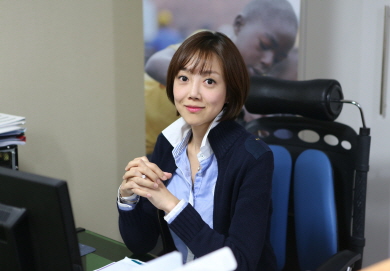
While Lee You-ree, CEO of W-Foundation, was also going through endless questions on choosing a career, she gave herself the answer of choosing a career that requires her intrinsic abilities that could not easily be replaced by someone else. After graduation, Lee was initially employed in a financial investment firm. The satisfaction and morale on the job was high. However, soon afterwards, she began to draw a bigger picture of her whole life, which she thought should be dedicated not to a single firm, but to a broader spectrum: to those who are in desperate need.
“Even though working in the firm was rewarding, I realized that my place at work could be replaced by many other applicants who are no less qualified,” Lee said. “On the other hand, not everybody could be interested in becoming a part of a non-profit organization.”
Thus, after working part-time in W-Foundation, which was established by her younger brother in his sophomore year in 2012, she soon became a full-time CEO of the foundation. W-Foundation, which stands for Wisdom for Future Foundation, is a global climate refugee fund. It supports climate refugees with the donations of public and private firms submitted by fund relief projects ranging from establishing infrastructure for safe water to basic sanitation. The foundation also runs projects to enhance educational programs for the youth and leads global public campaigns for better awareness of climate refugee problems.
As the first moment of an experience usually leaves a long-lasting impression, Lee vividly recalls her first relief project after Typhoon Haiyan struck the Philippines. Even though instant help and immediate results from the relief programs also mattered, Lee approached the tragedy in a more realistic way.
“Considering that the victims cannot be beneficiaries from relief programs forever, it was crucial to install a backbone for a sustainable development in the local community. This way, the people could stand on their own feet without the organization’s help in the long run,” Lee remarked.
For Lee, the essence of stretching the hands of aid and increasing the possibility for recovery lied in the delivery of specified and durable support. In the case of Typhoon Haiyan, the W-Foundation linked the local community with a Korean social enterprise that produced organic mosquito repellent with Citrus extract. By planting Citrus trees in the tropical areas, the local community could gather a stable source for living by exporting the ingredient for the repellent.
As seen from her experience in the Philippines, W-Foundation is unique in its approach to sustainable development and promotion of the refugee problem. Comprising of relatively young members compared to Korea’s conventional foundations which are usually backed up by conglomerates or businessmen, W-Foundation strengthened its merits of “being young with a flexible and open attitude.”
“We wanted to break the stereotype people had toward ‘foundation’ in Korea,” Lee said.
Although Lee and her members had a hard time convincing private firms for donations and cooperation, they gradually managed to persuade CSR (Corporate Social Responsibility) teams of various corporations by showing passion and determination. The foundation also proceeded fundraising with celebrities, producing a campaign program broadcasted in Cambodia using a format of a popular Korean entertainment program.
“We wanted to raise people’s awareness with concentrated and creative contents,” Lee commented.
Her emphasis on openness, transparency and flexibility while running a foundation can be partially attributed to her experience at Ewha. Being a founding member of DISCO (Division of International Studies Chamber Orchestra) and having worked as a Campus Leader, Lee learned how to integrate a set of people into an organized group. Writing and submitting registration paperwork to officially start the club and meeting and discussing with professors about running the club surprisingly resembled the process of persuading CSR teams at private firms for donations and partnership.
Lee is determined to further her projects in more diverse aspects of social problems.
“Although the foundation has stabilized over the past three years, it will need more time to settle perfectly,” Lee remarked. After settling in, Lee thinks she would be focusing on different subjects such as domestic problems of orphans and the disabled.
Ending the interview, she advised students to become more critical on analyzing their future career, which means having a keen observation on the behind-scenes of the profession.
“You should be aware of what your priorities are, wheather it be money, family, career or becoming a global female leader,” she advised. After all, one could be spending more time at work than with family, signifying their prioitization of work.
Throughout the interview Lee gave one possible answer to the dilemmas amidst the young job seekers: select a choice that optimizes satisfaction of your entire life.
Lee Yoon-soo
yoonpamom@ewhain.net

